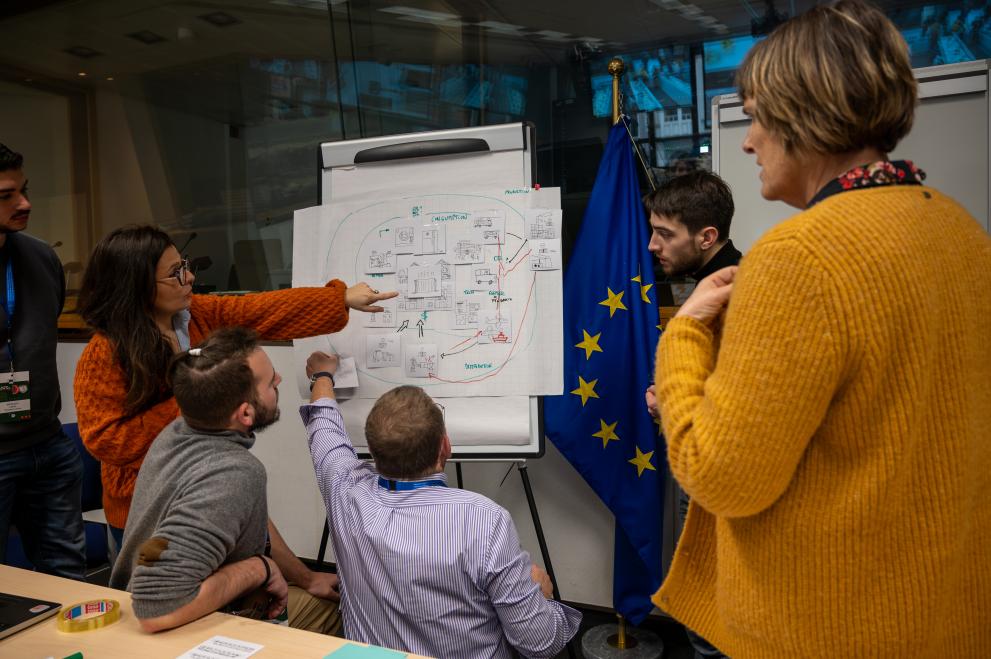Context and Objectives
Following the Conference on the Future of Europe, the European Commission has reinforced its commitment to inclusive and participatory governance by establishing a new citizen panel. Under the guidance of the DG for Communication and DG Energy, this European Citizens’ Panel focused on the topic of energy efficiency. This initiative is part of a broader strategy to enhance participatory democracy within the European Union, ensuring that citizens are directly involved in shaping key policies and initiatives.
In February, March, and April 2024, 149 randomly selected EU citizens from the 27 member states convened in Brussels and online. Supported by experts, their task was to develop practical recommendations on energy efficiency, a critical issue in the Commission’s work program, under the central question: “How can the European Union bring the benefits of energy efficiency to citizens, public authorities, and enterprises?” The participant selection process, managed by Harris Interactive, aimed to reflect the Member States’ population sizes while ensuring a minimum of two citizens per country. Factors such as geography (urban/rural), gender, age, education level, and socio-economic status were considered to mirror the diversity of the EU. The panel’s attendance was strong, with 23 out of 27 Member States meeting their participation targets. Ultimately, 149 out of the 150 targeted participants engaged in at least one session.

MISSION Modalities
As co-coordinator of the panels, Missions Publiques played a crucial role in this project. MP’s responsibilities included designing the methodology, composing and training the facilitation team, supporting logistical organization, coordinating communication with citizens, and aiding in the communication strategy. Additionally, MP facilitated moderation, assisted in synthesizing recommendations, and coordinated efforts with the European Commission interlocutors.
Added Value of the Approach
The European Citizens’ Panel on Energy Efficiency has provided substantial added value. By directly involving citizens in the policymaking process, it has democratized decision-making. The vast diversity of the panel ensured a wide range of perspectives, leading to comprehensive and inclusive solutions.
The panel’s recommendations, based on real-world experiences and expert input, aimed at being practical and actionable, enhancing the effectiveness of energy efficiency measures across the EU. The focus on empowering consumers, financing home renovations, and promoting education and job training in energy efficiency sectors has laid a strong foundation for future improvements in energy use, contributing to environmental sustainability, economic resilience, and social equity.
Key Figures
results
- Empower consumers to become energy efficient
- Finance a fair right to energy related home renovation.
- Increase energy independence and efficiency, becoming a global example.
- Achieve energy efficiency targets by strengthening everyone’s ability to act.
- Manage and monitor the implementation of EU directives.
- Improve the state of skilled labour in the EU in the energy efficiency sector.
- Secure the future through green education.
- Optimise and develop the grid system from producer to the end-user in favour of renewable energy sources.
- Help EU citizens to develop energy communities focused on energy efficiency by providing information and financial support.
- Develop energy-efficient communities for responsible consumption and increased local energy production.
- Expand the implementation of energy efficiency in buildings.
- Increase the attractiveness of public transport for passengers.
- Deliver the most energy-efficient transport across Europe: Get goods off the road, get people out of planes, and introduce a ‘railway first principle’.
Available
Interim report 1 – Delivered
Interim report 2 – Delivered
Final report – In progress
Vidéos
1st session: Recordings 23 February 2024 | 25 February 2024
2nd session: Recordings 15 March 2024 | 17 March 2024
Closing session: Recordings 12 April 2024 | 14 April 2024



